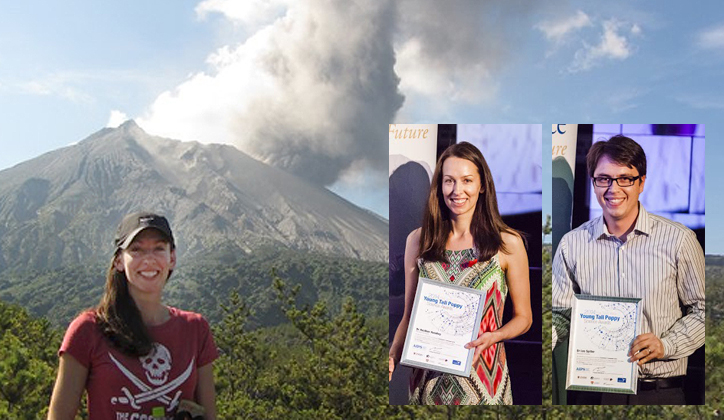Astronomer Dr Lee Spitler and Volcanologist Dr Heather Handley have been recognised amongst the best young scientists in New South Wales last week at the prestigious Young Tall Poppy Science Awards. The awards honour up-and-coming scientists who combine world-class research with a passion for communicating science.
Lee, a joint appointment between the Department of Astronomy and Physics and the Australian Astronomical Observatory, focuses his research on pushing current telescope technology to its limits.
“My research takes advantage of a useful characteristic of our universe; that light travels at a limited speed,” said Lee.
“With new telescope technologies we can observe light produced during an early period of the universe – when it was 3 billion years old and only a fifth of the age it is today. We are working towards completing a historical record of how galaxies like ours were created and evolved over the 13.7 billion year lifetime of the universe!”
Heather, from the Department of Earth and Planetary Sciences, also uses innovative new methodologies in her scientific research.
“It is widely observed that volcanoes erupt, mountains erode and landscapes transform,” she said. “However, relatively little is known about the timescales involved in these processes. My current research on the development of new methodologies for accurate dating of soils and sediments delivers a novel approach to understand climate-led landscape changes.”
As part of the Young Tall Poppy campaign, Lee and Heather will spend a year sharing their knowledge with school students, teachers and the broader community through workshops, seminars and public lectures.
Lee says astronomy is a great way for children, young adults and adults to think and be inspired by science.
“I’m really looking forward to getting to more schools, astronomy groups and community events throughout 2015,” he said.
“I’m thrilled to have been given the award and look forward to the opportunities it will bring next year to inspire, educate and enthuse the next generation of scientists, their teachers and the public,” said Heather.
Learn more about Dr Lee Spitler and Dr Heather Handley.

